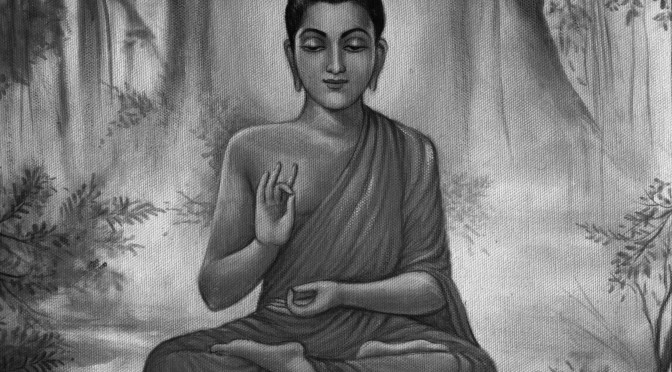Since becoming a Buddhist the most asked question I get from friends and family is ” So you pray to The Buddha “, In which my answer is usually along the lines of explaining to them that The Buddha is not deity, but more so a Great Teacher. A puzzled look usually appears to their face, in which their next question is ” So how is it a religion if there is no god, wouldn’t it be philosophy? “; my response is to them is both.
Now with that being said, I have been reading a book, that though the title is as creative as that of “Buddhism for Dummies” , the book “The Everything Buddhism Book” by Arnie Kozak, PhD. It is surprisingly and refreshingly an easy to understand book, that explains various traditions of Buddhism, history, terminology, etc. In this book there is a section called “Religion Or Philosophy” hence the title of this post, and in this section, the author credits Buddhist Scholar Damien Keown for comparing Buddhism to seven dimensions common to religion. The below is a list of those seven Dimensions.
- Practical and Ritual:
While the ritual elements of Buddhism may seem bare bones compared to the catholic church, for example, Buddhism certainly has rites and rituals that are public and private, many of which are associated with monastic life. Different Buddhist traditions place different emphasis on ritual. - Experiential and Emotional:
The experiential dimension is the most important dimension of Buddhism. The Buddha was the exemplar. he transformed his life not through belief but through experiential practice. And Buddhist follow a similar path. The truth of Buddhism must be experienced. Karen Armstrong notes that the Buddha “confined his researches to his own human nature and always insisted that his experiences – even the supreme truth of Nibbana (Nirvana) wee entirely natural to humanity.” - Narrative and Mythic:
Buddhism is not without its myths and legends, including those surrounding the life of the Buddha, which can be read as a parable as well as a biographical account of the historical figure known as Siddhartha Gautama. There are many narrative elements in Buddhism, including the Jataka tales. - Doctrinal and Philosophical:
The Buddha chafed at ‘doctrine’ and idle philosophical speculation and sought to teach through direct experience. However, Professor Keown says of doctrine, “if by ‘doctrine’ we understand the systematic formulation of religious teachings in an intellectually coherent form,” then Buddhism qualifies as having doctrine in this sense. For example there are The Four Noble Truths that are the foundation of the Buddha’s teachings. - Ethical and Legal:
Buddhism is widely regarded as one of the world’s most ethical religions, having incorporated ethics into the foundation of the experiential practices. The central ethic is to “do no harm.” Buddhism is predominately a path of peace. For example, the Dalai Lama has consistently advocated peaceful resistance to the Chinese occupation of his country, an occupation that has, by some estimates, claimed a million lives and destroyed 6,000 monasteries. - Social and Institutional:
The sangha is the community of Buddhist practitioners and it is one of humanity’s oldest continuous institutions. Yet the sangha is not an institution in the sense that it has a central authority such as the Vatican. It is a diverse collection of people across nations and cultures that practice the Buddha’s teachings in diverse ways. Buddhism is also a socially engaged religion seeking to make positive changes in society. - Material:
The material dimensions of Buddhism are vast, majestic, and colorful. Buddhist have built breathtaking monasteries, caves, and carvings of the Buddha. King Ashoka left a legacy of iconic structures called stupas across India. Buddhist art is colorful and narrative. Buddhist make pilgrimages to holy sites, such as the birth and death place of the Buddha, and the places where he became enlightened and gave his first sermon.
So is Buddhism a religion or a philosophy? It can be both. It can be a non-theistic religion, or a completely secular code of ethics that can be applied to your current path in life.

